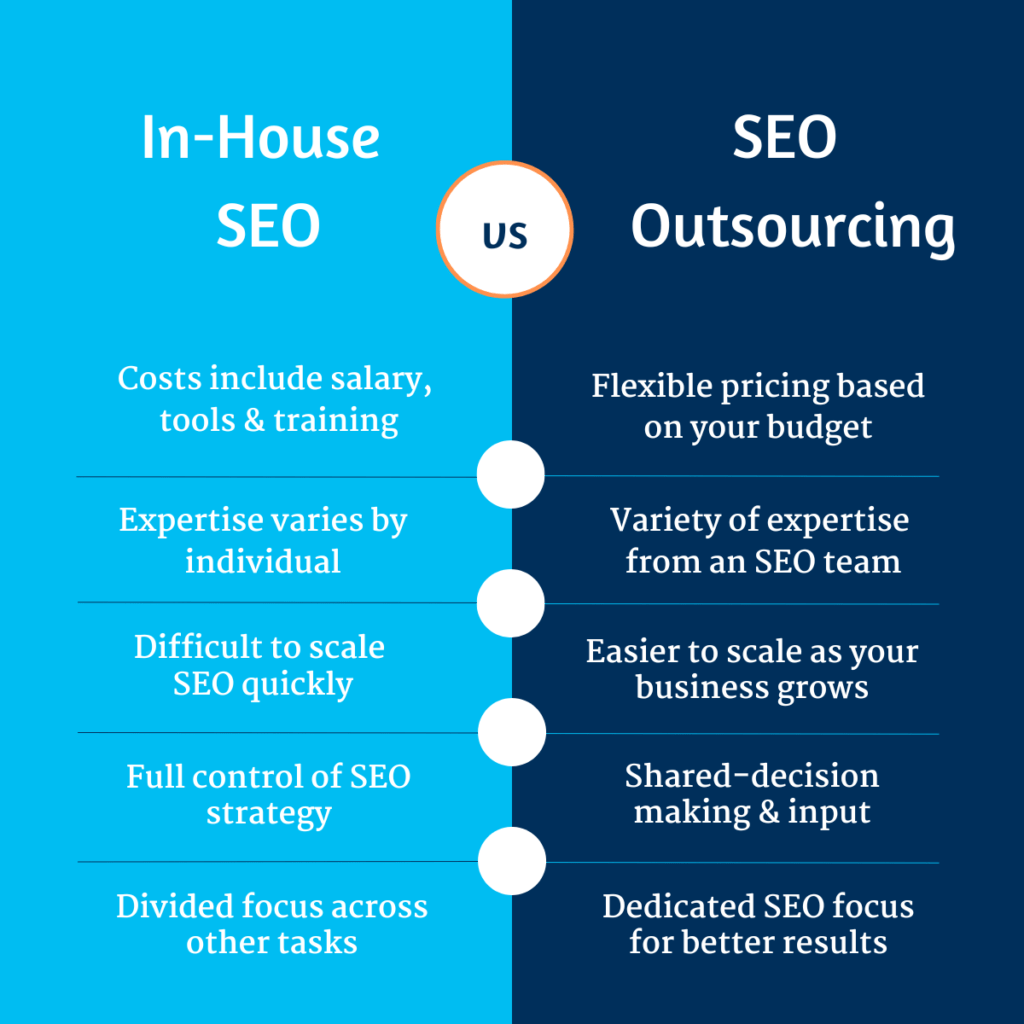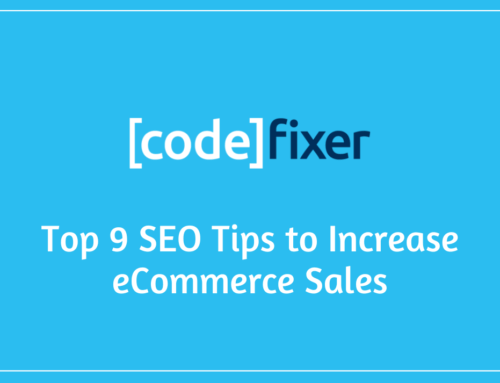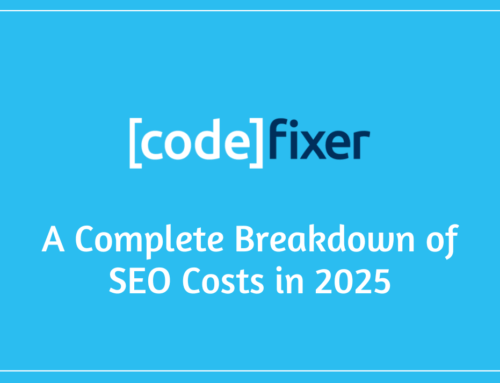Search engine optimisation (SEO) is essential for driving organic traffic and lead generation by helping businesses rank higher on Google. Securing the top spot is highly desirable, with position one on Google having an average click-through rate (CTR) of 27%. And with each position seeing a 32.3% decline compared to the last, the competition for high positions hasn’t been fiercer.
With frequent algorithm updates and over 200 ranking factors, keeping up with SEO best practices is both complex and time-consuming. This leaves businesses asking: should they manage SEO in-house, or is outsourcing SEO the smarter choice? In this blog, we’ll help you weigh both options so you can make the right decision for your business.
What is In-House SEO?
In-house SEO refers to managing your business’s SEO efforts internally. Depending on the business size, this could involve a dedicated SEO team or integrating SEO tasks into existing roles.
An in-house SEO team, often led by an SEO specialist or manager, collaborates with marketing and web development departments on a range of SEO strategies, including on-page optimisation, backlink building, local SEO and technical audits.
What is SEO Outsourcing?
SEO outsourcing is when a business hires an external SEO agency or freelancer to manage its search engine optimisation efforts. In essence, outsourcing frees up your business’s resources and time so you can focus on its core tasks and goals while leaving your SEO needs in experienced hands.
An outsourced SEO team will work with your existing marketing departments so that SEO tasks are completed without causing delays or conflicts with ongoing strategies. Outsourcing SEO services include expert keyword research, on-page optimisation, link building, technical audits, and professional content creation.
SEO In-House vs SEO Outsourcing – Key Differences
Before making a decision, it’s important to understand the differences between in-house SEO and outsourcing SEO. Factors like cost, expertise, and scalability should all play a role in your final choice. These factors are summarised here but will be discussed in detail below.

Pros & Cons of In-House SEO
For businesses considering investing in in-house SEO, let’s examine both the advantages and disadvantages of managing SEO in-house.
Pros of Taking Your SEO In-House:
✅ Full Control Over Strategy
A big advantage for companies that choose in-house SEO is the complete control of their SEO strategy. You can direct your in-house team to prioritise certain aspects of SEO, like link building, if you believe that element is causing competitors to outrank you. You also have greater flexibility to make immediate adjustments without having to rely on external input.
✅ Dedicated Focus
An internal SEO team lives and breathes your company’s philosophy and understands its long-term goals and objectives. They aren’t distracted by other client SEO projects, so they can dedicate their entire focus to keeping the SEO strategy specific to your company and industry while achieving the best results for your company.
✅ Quick Internal Communication
Keeping SEO in-house tends to lead to quicker communication and better collaboration with other internal departments like web development, graphic design, and marketing. This streamlined communication enables changes to be implemented, issues to be resolved, and new strategies to be ironed out much quicker than with an external SEO team.
✅ Timely Internal Reporting
Depending on established internal protocols, in-house SEO teams may provide relevant departments, like marketing, with regular SEO reports. Because of the deep knowledge of internal and long-term business goals, these reports can be tailored to highlight specific KPIs.
Cons of Taking Your SEO In-House:
❌ Higher Costs
Arguably, the biggest con of hiring in-house SEOs is that it tends to be much more expensive than outsourcing, especially if you have a complex SEO strategy that requires multiple specialists. Aside from matching market salary rates, you have to consider the cost of hiring a new employee and providing them with quality SEO training.
Plus, for a successful campaign, you’ll need to factor in substantial monthly subscription costs (typically in the thousands of pounds) for necessary SEO software like SEMrush/Ahrefs, Screaming Frog, and Advanced Web Ranking (AWR). And, to stay competitive and in line with current best practices, in-house SEOs will need access to SEO events such as conferences, webinars, and talks, which is another additional cost to consider.
❌ SEO Skill Gaps
When hiring in-house specialists, finding people with a full range of expertise can be challenging. Some may specialise in link building, while others create content. But, with SEO, nothing is guaranteed, and websites can be affected by an algorithm update or the need for a website migration. An internal team may not have the skills to overcome these changes, negatively impacting the timeline and success of your business’s overall SEO strategy.
❌ Outdated Practices
Unfortunately, some SEOs still believe that strategies like keyword stuffing and content quantity over quality are still good practices. Without consistent exposure to SEO industry trends and changes and the influence of AI on SEO, an in-house team can easily fall behind and accidentally make damaging mistakes to your business’s SEO success.
❌ Less Accountability
Since your in-house SEO team operates internally, enforcing strict performance metrics or holding them accountable for achieving specific results over a set period may be harder. Internal specialists have less at stake in achieving certain performance metrics than an external team.
Plus, in our experience, it’s not uncommon to see inexperienced SEOs in managerial roles who don’t understand what metrics to measure and what their benchmarkers are. And so, because they don’t know the right targets to hit, they won’t know in what areas their team’s SEO efforts are slacking.
❌ Scaling is Challenging
Scaling your in-house SEO efforts often requires hiring additional staff, which can be time-consuming and resource-intensive. It requires a careful balance of ensuring your SEO team has the necessary skills and work to scale up efficiently without wasting resources and budget on an accidental premature hire.
❌ Retention Issues
With the growing awareness of SEO and its importance in achieving high website traffic and qualified leads, there is a high demand for SEO professionals, making it difficult for businesses to retain top talent without increasing budgets.
Pros & Cons of Outsourcing SEO
Below, we’ve broken down the key points for businesses considering investing in SEO outsourcing to help you assess whether outsourcing is the right choice for your business.
Pros of SEO Outsourcing:
✅ Access to Specialised Expertise
SEO outsourcing gives you access to a team of professionals who are experts in various aspects of SEO and who prioritise keeping up-to-date with SEO trends and predictions. SEO agencies want to retain clients and showcase the success of their SEO efforts, so staying ahead of the curve is paramount for their success. Any SEO agency worth its salt will regularly attend conferences and encourage its staff to upskill to sharpen and broaden their skills. This breadth of knowledge can be difficult to achieve with an internal team.
✅ Cost-Efficiency
Outsourcing SEO is often more affordable than building and maintaining an in-house SEO team. By outsourcing, you don’t need to worry about the costs associated with an internal team. Many SEO agencies have access to their own preferred software and resources to get the job done quickly, bypassing any delays in producing results because of new software training. Plus, most have flexible pricing options, which can be customised to your SEO needs.
✅ Flexible with Scalability
When deciding to scale up your business or make the necessary changes to downsize, it can take time to figure out what to do with staff numbers. Scaling up involves finding the right balance of hiring additional staff at the right time without wasting resources and budget. Downsizing might involve exploring how to restructure roles internally without negatively affecting your current SEO efforts.
Outsourcing your SEO to agencies means they can easily adjust with you. They can bring more people onto your account or reassign them to other projects based on your needs.
✅ Focus on Core Business
Many small- to medium-sized businesses can often rely on existing staff to take on SEO efforts to help save on costs. But, unfortunately, we’ve found that usually doesn’t end very well. It’s like expecting the head chef of a restaurant to fix plumbing issues. By outsourcing SEO, your internal teams can focus on what they do best and work toward achieving their business goals faster.
✅ Detailed Reporting
To help companies stay focused on other business goals, many agencies offer detailed monthly SEO reports that highlight key metrics and areas needing improvement. They provide clear explanations of performance changes and upcoming strategies to maintain or improve results. Additionally, along with measuring tailored KPIs, these reports can also reveal influencing factors, such as backlink profile health, that may be overlooked in internal SEO reporting.
✅ Cross-Pollination
In marketing, cross-pollination is the concept of exchanging ideas and solutions between industries. This is another reason why networking events are a must for any internal or external SEO. Just like a bee bringing fresh diversity to a new plant, marketers (and SEOs) can learn new ways to overcome challenges in different industries.
Outsourcing to an SEO agency with experience in different industries means that they know how to adapt successful strategies from one industry to suit another. Plus, with cross-pollination, it’s easier to see new trends being adopted across industries, enabling outsourced SEOs to keep your business ahead of the curve.
Cons of SEO Outsourcing:
❌ Less Direct Control
When you outsource SEO, you may have less control over the day-to-day decisions than if you kept SEO in-house. If changes need to be implemented or issues that need to be addressed quickly, you’ll need to rely on the outsourced SEO team for input before doing anything. However, we find that regular communication with clients goes a long way toward overcoming these issues.
❌ Potential Communication Delays
Lack of communication between the client and their SEO agency can be the death of an otherwise successful SEO campaign. Changes might not be actioned soon enough, concerns about dropped traffic go unanswered, and bare minimum contact can lead clients to be frustrated and taken advantage of.
Sometimes, it can be difficult to judge the level of communication you’d expect before agreements are signed, so we always recommend requiring a minimum level of communication in contracts, such as monthly meetings, reports, and check-in emails or phone calls.
❌ Varying Quality of Agencies
Because SEO can be difficult to measure, the quality of services can vary greatly. Unfortunately, seeing as there’s no barrier to entry, there are too many so-called SEO specialists who are happy to take your hard-earned money while delivering very little in return (and typically with minimal communication, too). To help weed out the mediocrity, we suggest looking for SEO agencies with a proven track record.
❌ Learning Curve
At the start, there may be a learning curve as the outsourced team familiarise themselves with your business and your industry. After all, SEO is their expertise, so they may not have experience working within your niche. However, we’ve found an in-depth discovery call and a detailed SEO audit of a client’s website drastically minimise disruption in implementing an SEO campaign. But, if possible, we recommend choosing a quality SEO agency with experience working within your industry to help minimise this disruption even more.
5 Considerations When Choosing Between In-House SEO vs Outsourcing
Before making a decision, consider these key questions to determine which option is best suited to your business needs:
Is SEO a Long-Term or Short-Term Investment?
This is a tricky one because SEO is most effective when considered a long-term strategy. Whether you choose in-house or outsourced SEO, it can take weeks or months to see the fruition of a successful SEO campaign, so ideally, it’s best thought of as a long-term investment. It’s important to weigh the pros and cons of either option with your long-term goals in mind to decide on the best path.
What is Your Budget for SEO?
First off, no matter if you have in-house SEOs or outsource your SEO, it’s important to understand that a quality, successful SEO strategy doesn’t come cheap, nor should it.
If you do see cheap SEO services advertised, it’s better just to sink your cash yourself because you’ll most likely get little work followed by a barebones monthly report with vague promises of better results next month if you stay on board.
For some businesses with the budget to hire internal SEOs, keeping SEO in-house makes sense, especially if you work in high/strict security sectors. However, outsourcing SEO tends to be the more favourable option for most businesses of all sizes and budgets. For example, it’ll suit those with limited funds, those who understand the importance of long-term SEO investment but aren’t sure of their needs, and those who want SEO expertise on hand without the cost of an in-house team.
What Expertise Level Do You Need?
Outsourcing provides access to specialised knowledge, which is ideal for businesses with advanced needs like website migrations, local SEO optimisations, and link building.
Using website migrations as an example, as we helped a client with theirs recently, a successful migration requires a skilled SEO specialist who can help manage other technical specialists and web developers simultaneously to ensure that the website migration is as seamless as possible. Tasks include ensuring all URLs redirect correctly, the new website’s metrics are tracked accurately, and everyone follows SEO best practices.
Without this expertise, your website will likely experience a damaging drop in lead generation, revenue, and Google positioning while negatively affecting User Experience (UX). Having this level of knowledge in-house isn’t common, and a higher salary would typically be demanded if it is. However, if your SEO strategy is simple, like only needing keyword research, on-page optimisation, or competitor analysis, an in-house team may be enough to handle these tasks.
How Big is Your Business, and Are You Trying to Grow?
Larger businesses, typically those with over 250 employees or a turnover of more than £200 million, can generally manage their SEO in-house. They may rely on external contractors for supplementary help but would depend on their internal SEO team to handle the day-to-day. Smaller businesses, especially those wanting to grow but who might not have the resources to hire in-house, might find outsourcing SEO a better option for scaling without impacting their budget too much.
But, it’s worth noting that outsourcing SEO is an excellent option for businesses of all sizes. You can customise the budget and SEO strategies based on your business goals and have access to expertise to handle any challenges.
Does SEO Align with Your Business Goals?
SEO, in essence, is improving your website’s visibility on search engines. And with Google seeing roughly 8.5 billion daily searches worldwide, it’s a massive piece of the market for businesses to miss out on. Companies prioritising SEO in their marketing strategy are typically looking to grow and expand by improving their organic traffic, resulting in better lead generation and higher revenue.
Though either outsourcing or keeping SEO in-house might work to make the most of your resources, the former is usually a better choice. It leaves you to focus on other business goals without sacrificing time or money.
In-House SEO vs Outsourcing – Which is the Better Option?
Whether you choose in-house SEO or outsourcing SEO ultimately depends on your business’s size, resources, and goals. Below are some scenarios where each option might be better suited.
When is In-House SEO the Better Choice?
- Large corporations with extensive resources to hire and manage an entire in-house SEO team.
- Businesses that need complete control over their SEO strategy to comply with internal security protocols, like financial institutions or government agencies.
When Should You Outsource SEO Externally?
- Small to medium-sized businesses, like local retailers, startups, or small service-based companies, who would benefit from cost-effective, expert-driven strategies.
- Businesses with immediate SEO needs, like new e-commerce websites or those in the technology sector, that want to scale their SEO efforts quickly.
- Organisations lacking in-house SEO expertise, such as real estate agencies or law practices, that don’t have the knowledge to manage advanced SEO strategies.
Partner with a Trusted SEO Agency
Choosing between in-house SEO and outsourcing can be tricky, but our experience as SEO experts suggests outsourcing to a trusted agency is often the most practical solution. While handling SEO internally can work for some businesses, the complexity and constant changes in SEO make outsourcing the best choice for long-term success.

In the past, we’ve noticed many of our clients have first approached us for our SEO training with the idea of managing their SEO themselves. However, during training, they quickly saw the value in entrusting us with these important tasks. What sets us apart, and something we pride ourselves on, is our level of communication and collaboration. We work closely with you to build the perfect strategy to get the best results because, after all, when you succeed, so do we.
Ready to Take Your SEO to the Next Level?
We’re currently accepting new clients and would love to help your business thrive with expert SEO strategies. Get in touch today to explore how outsourcing SEO can drive growth and improve your rankings.





